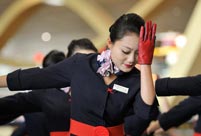 Int'l Snow Sculpture Art Expo in Harbin
Int'l Snow Sculpture Art Expo in Harbin Sichuan money wall for dividend payment
Sichuan money wall for dividend payment Li Na crashes Belinda Bencic in 2nd round at Australian Open
Li Na crashes Belinda Bencic in 2nd round at Australian Open
 Shocking moments when PLA's weapons open fire
Shocking moments when PLA's weapons open fire Famous Lanzhou beef noodles
Famous Lanzhou beef noodles Armed Police hold anti-terrorism drill in SE China's Xiamen
Armed Police hold anti-terrorism drill in SE China's Xiamen Harbin Int'l Ice and Snow Festival opens
Harbin Int'l Ice and Snow Festival opens 'Jin' named the word of the year by cross-strait netizens
'Jin' named the word of the year by cross-strait netizens Chinese scientific expedition goes to build new Antarctica station
Chinese scientific expedition goes to build new Antarctica station
BEIJING, Jan. 27 -- Jan 27 marks the 50th anniversary of the establishment of diplomatic ties between the People's Republic of China and the Republic of France. Being the first between China and a Western power, China-France ties have developed beyond ordinary bilateral ties.
The two countries' soft power and interactions have played a key role in the development of this bilateral ties. Both have rich cultural histories and made huge contributions to political thought, literature, art and technology.
Chinese people have long been interested in French literature and culture. Through the works of Victor Hugo, Honore de Balzac, Gustav Flaubert, Alexandre Dumas and Emile Zola, Chinese people have gained a deeper knowledge of France and French culture than other European countries.
The French have a tradition of learning from Chinese culture, too. Sinology flourished in Paris as early as the 17th century. And Chinese culture has attracted greater attention in France with the rise of China in the recent decades.
It was cultural interaction, which began long before world history entered the contemporary era, that laid the foundation of China-France friendship. The friendship was boosted by France's soft power and independent foreign policy, which prompted Paris to establish diplomatic ties with Beijing in 1964 during the Cold War, when the United States and its Western allies viewed China as an enemy. France's bold gesture was welcomed and reciprocated by China.
The policies of former French president Charles de Gaulle have been followed by almost all the administrations after him. Following those policies, former presidents Jacques Chirac and Nicolas Sarkozy, and current President Francois Hollande have developed or strengthened strategic relations with China.
France's soft power also promoted new thinking that played a vital role in integrating Europe into an economic union. Starting from the 1950s, France was the main propeller of European integration, and its role in the formation and development of the European Union is paramount.
After the end of the Cold War, France raised the idea of "a multipolar world", emphasizing the role of the United Nations in promoting dialogue to end confrontations and resolve conflicts. That echoed the foreign policy of China and helped the two countries to work together to the benefit of the entire international community.
As two permanent members of the UN Security Council, China and France have played a coordinated role in maintaining world peace and opposing hegemony. And the similarities in their foreign policies have pushed their ties forward.
Fifty years of friendship is ample evidence that China and France have solid cultural foundations. France and China both are paying more attention to strengthening their soft power which hopefully will further consolidate their relations.
The author is a researcher at the World Affairs Research Center, Xinhua News Agency.
 A 60-hour journey home
A 60-hour journey home Int'l Snow Sculpture Art Expo
Int'l Snow Sculpture Art Expo Highlights of China's air force
Highlights of China's air force Airline crew stage flashmob dance at Kunming airport
Airline crew stage flashmob dance at Kunming airport Top15 countries to retire to in 2014
Top15 countries to retire to in 2014 Hot supermodel's new photo album released
Hot supermodel's new photo album released Asia's heaviest box girder finishes 'rotation' in Wuhan
Asia's heaviest box girder finishes 'rotation' in Wuhan Completed facade of People's Daily new headquarters
Completed facade of People's Daily new headquarters Chinese-branded car passes North America standard safety test for the first time
Chinese-branded car passes North America standard safety test for the first time Li Na beats Bouchard to reach Australian final
Li Na beats Bouchard to reach Australian final  Explore the sources of PM 2.5
Explore the sources of PM 2.5 Highlights of Chinese airborne troops'exercises
Highlights of Chinese airborne troops'exercises  'Living in ice house' competition held in central China
'Living in ice house' competition held in central China  Chinese figure in Oscar nominations
Chinese figure in Oscar nominations  Top ten aerospace events in China 2013
Top ten aerospace events in China 2013Day|Week|Month